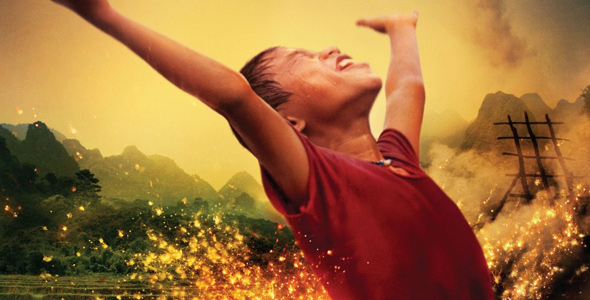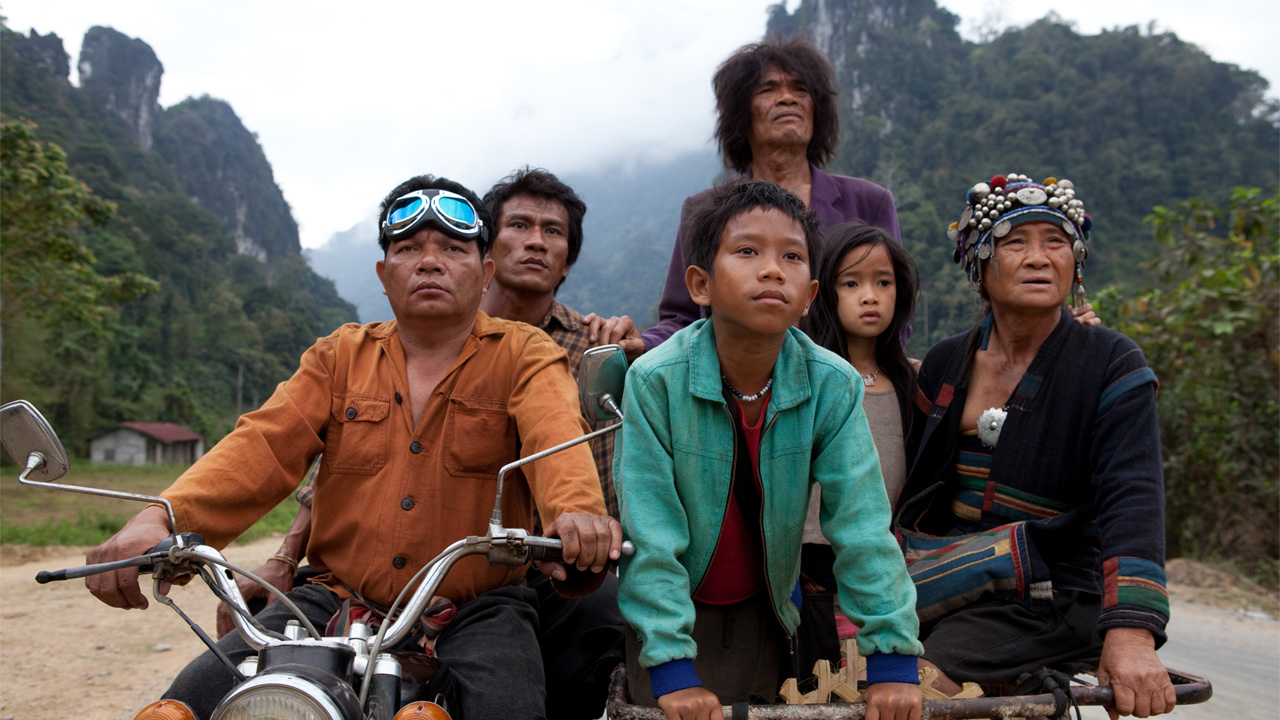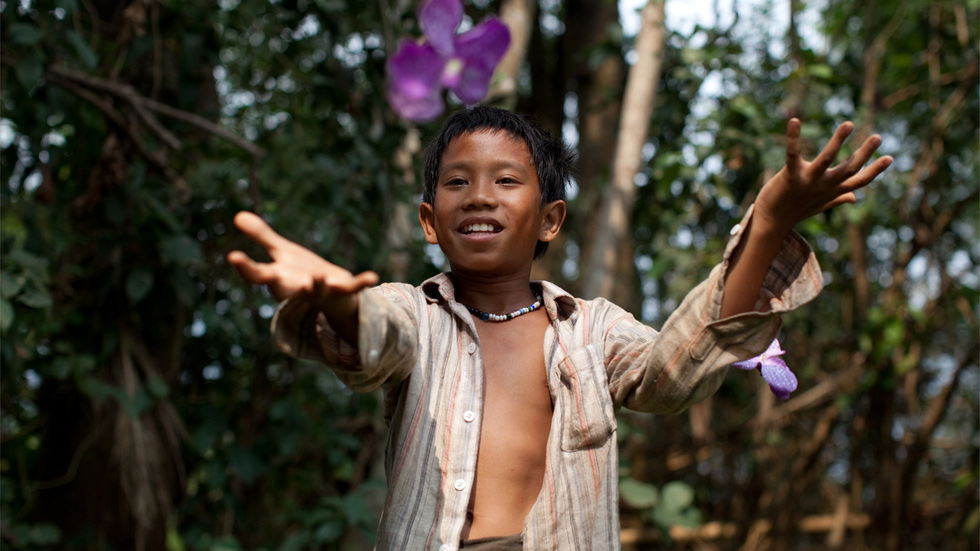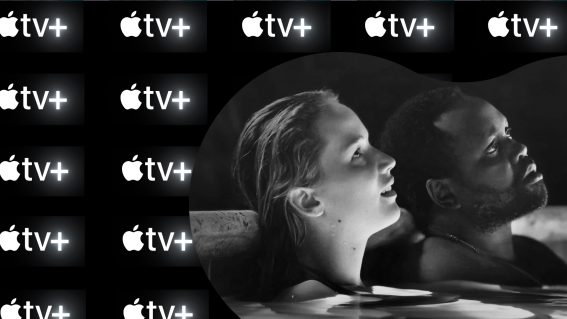Interview: ‘The Rocket’ director Kim Mordaunt
Set in the remote countryside of Laos, Southeast Asia, The Rocket is a Berlin Film Festival-winning journey follows Ahlo, a 10-year-old boy who is a supposed bringer of bad luck. To prove that isn’t the case, Ahlo has a fool-proof plan – build a giant explosive rocket to win the annual Rocket Festival. This is […]

Set in the remote countryside of Laos, Southeast Asia, The Rocket is a Berlin Film Festival-winning journey follows Ahlo, a 10-year-old boy who is a supposed bringer of bad luck. To prove that isn’t the case, Ahlo has a fool-proof plan – build a giant explosive rocket to win the annual Rocket Festival.
This is the debut narrative feature from Australian documentarian and all-round nice chap Kim Mordaunt. Assistant editor Liam Maguren (who gave the movie four stars in his review) had a lengthy talk with the writer-director about the film.
‘The Rocket’ is now playing nationwide. Check for session times.
FLICKS: I just saw ‘The Rocket’ last night and it’s one hell of a charming little film. I’m looking at this very long list of awards that back my opinion up – you scored massively at Berlin and Tribeca. All the relevant Australian film awards have praised this film too, as they should.
KIM MORDAUNT: We are very, very lucky.
Why do you consider yourself lucky?
Oh, I don’t know. I never expect anything, really. When you make a film and come to the end of it, everyone’s so exhausted and demoralised because you’re broke, and you’re getting a hard time by everyone. When you put it in front of an audience, you don’t know what to expect, and Berlin just went off. You’ve also got Cannes and Sundance – the three big ones – and we were just happy to be there. It was all just a great surprise.
I think one of the biggest pulls of the film is how it’s so centred on Laos and can be claimed as the country’s first internationally-released feature.
Laos has got some good young filmmakers but they haven’t got a funded industry. The Laos community in Australia – we had about 400 at the Sydney Film Festival – really loved the film and have taken ownership of it. That was very, very important to us. That only happened because we collaborated a lot with the Laos community in Australia and in Laos so that’s not a mistake. That’s something that’s gone through a long, long collaboration.
Hopefully, that opens the doorway to more recognition in the Laos film making community.
Yeah, absolutely.
This film happened largely because of your previous documentary, ‘Bomb Harvest’. Was it perhaps during shooting of ‘Bomb Harvest’, where you investigated the leftover bombs that still needed to be defused in Laos, that you decided you need to make a fictional film set in Laos?
That’s right. It even goes back a bit further than that. The producer, Sylvia Wilczynski and I, we lived in Vietnam in Hanoi and we worked there about ten years ago. We travelled to Laos a lot; we loved the country, we love the people and found out this horrific war history that we had no idea about. We were like, “we know about the Vietnam war but bloody hell, Laos is the most bombed country per capita on the planet – why didn’t we know about this?”
That’s what inspired us to make Bomb Harvest. But while Bomb Harvest did very well internationally and the Laos community loved it, a lot of people said, “we love [main character] Laith Stevens – he’s a great Australian character – but why can’t it be a Laos romantic lead and why can’t it be in the Laos language? Why does it always have to be Anglo and English?”

So, we took a big breath and thought, ‘okay, let’s give this a go and collaborated again with the Laos community in Sydney – in particular a woman called Pauline Phoumindr. Bomb Harvest was life changing for Sylvia and I, and once you’ve been inside the legacy of war at ground level – like we didn’t just go in and out of it, we were there for months and months and months and researching for months and months and months, and literally filming with a bomb disposal team day and night for, you know, weeks and weeks on the Ho Chi Minh trail. It’s not something you walk away from – we spent a lot of time with the kids who collect the bomb scrap metal as well and wanted to continue that journey working with the Laos kids. But, once you’ve done that, we had nice little genre scripts that we’d been developing through Screen Australia and Screen New South Wales and it just felt indulgent.
So, we thought, “we can’t just walk away from this now. It’s well and truly in the gut.” So, we continued that journey, exploring the legacy of war. But also, for The Rocket, which is very important was the first world’s relationship with developing countries. The relocation of traditional people is something we witnessed all over Laos as well.
I love that about ‘The Rocket’ as well, that it does touch on those issues but it doesn’t feel it needs to take up a lot of the running time to have its own subplot about western culture nudging in on a traditional culture. But still makes you very aware of it.
Yes. With every single film I’ve made in the last 15 years – we’ve always thought that if you’re too heavy-handed about politics and bashing people over their head with it, they’ll generally switch off. Or you’re only going to have the people who are going to watch that film who already believe in what they’re watching.
So, it’s a very powerful tool, cinema. If you can just give people a great story – a deeply emotional, exciting story – and entertain them, and entice them, and emote them, and just nudge in the politics underneath, very quietly. That way, you’re not lecturing audiences, you’re just posing questions and getting them to interact with these ideas, and to play around with these ideas. Sylvia and I really are strong believers that that’s actually much more powerful because you entice people who might not usually even think about these things into thinking about them.
The Rocket Festival is quite interesting because that doesn’t actually appear to have any mention until about halfway into the movie. Having been to the Rocket Festivals, was being a part of the festival something that inspired you to write the story? Or did you already have a story in mind, and the Rocket Festival was incorporated into it?
It’s a good question. I’ve been to about ten of them now and so has Sylvia, so when we’re trying to think of a narrative for this film, we kept coming back to the Rocket Festival. We kept thinking, “my god, this festival is exciting, it’s fun, it’s dangerous, it’s hilarious, it’s all of those things, it’s very cinematic on all those levels,” but when you start to think of the meaning of the festival as well, it’s so complex and layered, and that’s really what the reason is why we couldn’t leave it. Not only is it a calling for rain and an ancient festival – full of all the mysticism of the country – but it’s also this great metaphor for it’s recent war history. You’ve got people shooting back at the sky, people from the most bombed place on the planet. So, there’s this huge, communal catharsis that goes on.
Laos has more than 50 dams in planning, the whole country is being relocated with dams appearing all the way to Mekong. You’ve got a country where water is becoming a commodity – it’s being owned and it’s being manipulated – and then you’ve got this festival that is calling for water as a complete life force. So, I think that’s where it all started.

It really works with Ahlo’s personal story because it seems like the whole world is against him when he realises he has been marked for bad luck and that is infused with their tradition. So, while the movie often is cynical about some attitudes it also uses tradition to be his ultimate saviour.
Absolutely, yes. And it is like that. In Laos, one thing that we experience very strongly is that – especially because majority of the country are Buddhist or Animist – in that world people really do believe that there are good and bad spirits floating in everything that lives, anything that is tiny or huge like in all the elements: in water, in fire, in rivers, in the skies. So, in a place where people really believe that, good and bad things come all the time and people really believe that these can be forces behind you. There’s something larger than themselves at work, and we thought that was really powerful and definitely should be a part of the narrative, giving the film this fable-like quality because of the surrounding folklore, mysticism and rituals.
I think calling it almost fable-like is pivotal because you could get overboard and make it too ghostly or spiritual to where it’s not convincing or it could be completely cynical and then just crap on the culture’s traditions, but I think you guys thread the needle perfectly.
Yeah, and Laos is like that. It really is a mixture of the ancient and the modern. People are practicing things that are ancient when you could become over-ethnographic about that and it’s important not to. But at the same time, they’re reinventing these ritual, these forms into really funky, witty, modern vernacular. One thing that struck us about the Laos people is they’ve got this wit that is very modern and very popular. So, for us it was important to not fall into those clichés – that people are sitting around moping after war or that we’re just looking at a kind of ethnographic version of the country.
One of those modernised version of those traditions in the Rocket Festival that really made me laugh is how they kept putting rockets to their crotches and referring to the thunder as the arse of the God and how they had to shoot their rockets up into it.
That’s right, we really loved that. When we first found out about the Rocket festival, we thought we loved it so much because of it’s irreverence. It’s not people sitting around, praying and moping – it’s people actually going, “Fuck you Gods, we’re gonna get you! Piss on us, you bastards!”
“We’ll thrust this rocket right up your arsehole.” It was great.
We loved that, it’s really fresh, and modern, and some how timely.
Young Sitthiphon ‘Ki’ Disamoe, who plays main character Ahlo – how did you find that talented little actor?
We actually found out about him through a Thai casting agent – when I met him for the first time, I just fell in love with the little dude. He had such a strong sense of self and a lot of the other people I’ve been seeing that we’d been trying to cast were either too shy in a way or had been too protective in life. Ki just had a very good sense of self and I guess that is because he had been a street kid for two years. He had to grow very fast, he had to survive and he could do anything he put his mind to. And if he couldn’t, he would learn how to.

When he first came to me, I said, “Ki can you swim?” He said, “I can hold my breath under water for half an hour.” And we found out he couldn’t swim, we had to give him swimming lessons for the next few months. But the fact was, he was a complete survivor and he would make anything happen that he felt like should happen. He had all that external wit and life and physical determination but to be honest we couldn’t get his emotions to begin with. He was very protective and probably being a kid does that. You do not show your vulnerability and you’ve got to survive and you’ve got to be tough. So, it took a while of screen testing and rehearsals before he started opening up his emotional self to us. And part of that was to share. I shared everything that had hurt me in my life and he started sharing with me as well.
What’s next for you? Will you return to Laos or venture somewhere else to shoot another film?
My main motive is to make another film with the producer, Sylvia, and we’ve been writing another film at the moment which is partly set in Australia and Africa. So, we’ve just come back from a research trip in Africa and I’m writing away on the draft at the moment. So, that’s the next immediate thing. But, this time it’s an adult love story, and still a legacy of war theme. That’s something we haven’t got out of our gut yet and probably won’t for a while.
Then just reading lots of screen plays that are being sent – American and Australian screenplays – which is really lovely to be reading a lot. But, it’s just about finding the right project.
I look forward to it.
Thank you.























